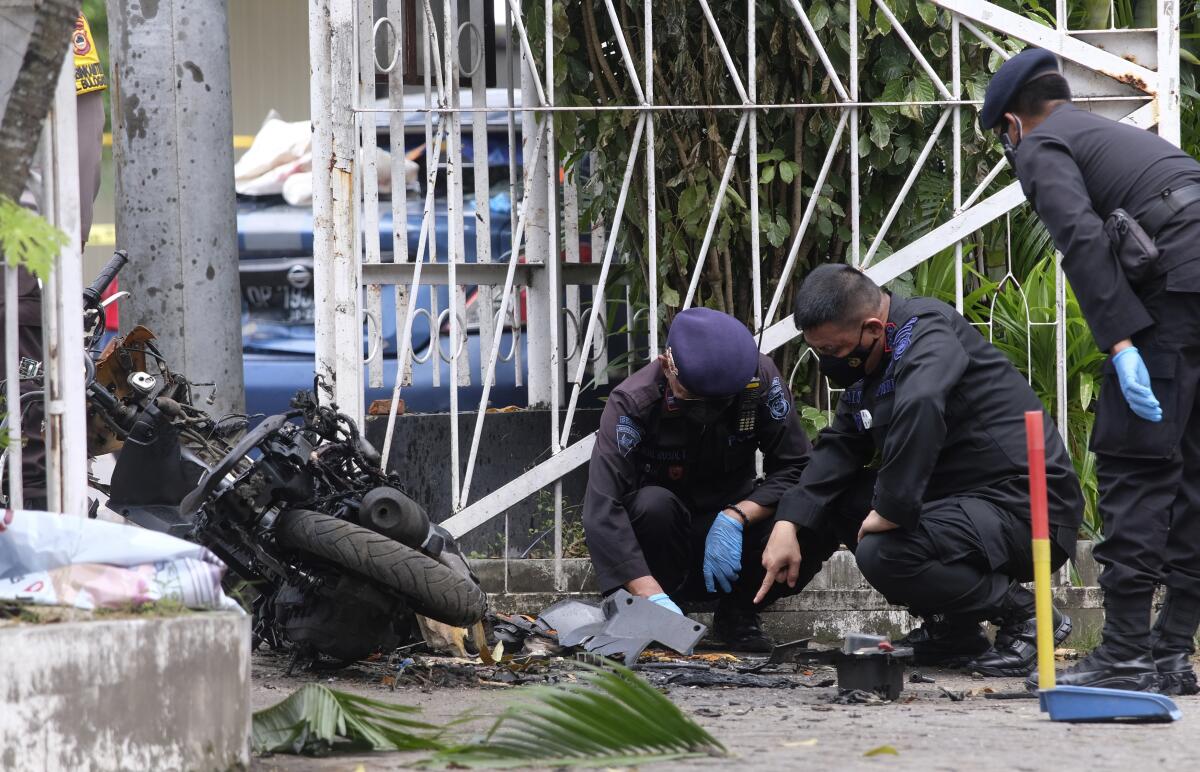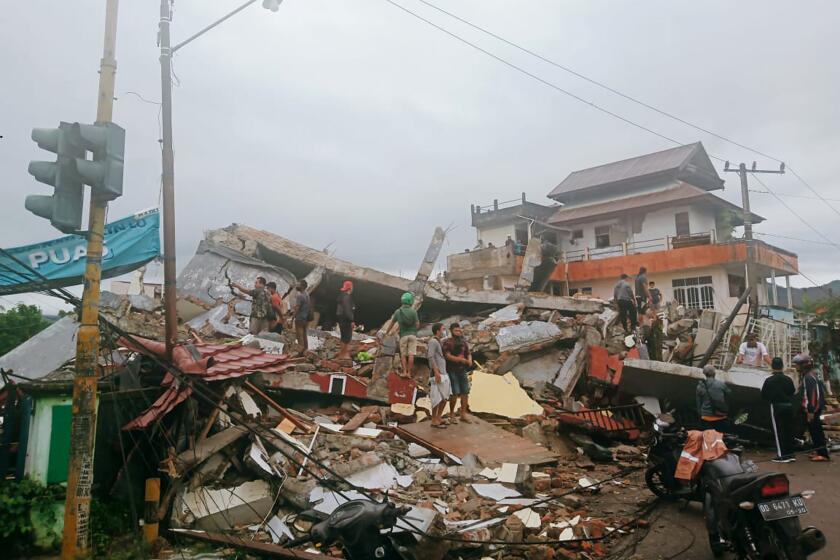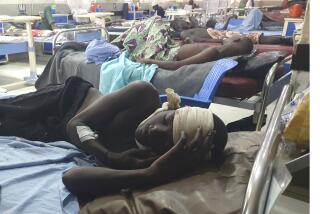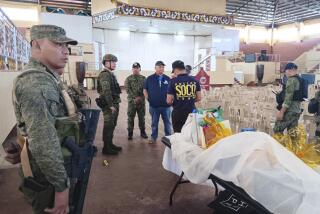Militant newlyweds suspected of suicide attack at Indonesian church

- Share via
MAKASSAR, Indonesia — A recently married couple with suspected militant links used pressure-cooker bombs to blow themselves up outside a Roman Catholic cathedral during Palm Sunday Mass, Indonesian officials say.
The attack wounded 20 people, including four church guards, and broke windows at the church and nearby buildings in Makassar, the capital of South Sulawesi province.
The couple were married six months ago, and police were investigating their house in Makassar, National Police spokesperson Argo Yuwono said Monday.
Police declined to name the couple. Neighbors said the two were between 23 and 26 years old.
The attackers detonated their bombs when they were confronted by guards outside the church.
The pressure cookers contained explosive materials and nails, said Makassar city police chief Witnu Urip Laksana. Police carried out DNA tests to determine the attackers’ identities.
A firebrand cleric who inspired the Bali bombers leaves prison after completing his prison sentence for funding the training of Islamic militants.
The couple were believed to have been members of Jemaah Anshorut Daulah, which has pledged allegiance to the Islamic State group and carried out a series of suicide bombings in Indonesia.
Those include a 2016 attack on a Starbucks in Jakarta that killed four civilians and four militants, an attack on a Jakarta bus terminal that killed three police officers and an attack on a church in Kalimantan that killed a 2-year-old girl. Several other children suffered serious burns in the Kalimantan attack.
Indonesia’s last major militant assault was in May 2018, when two families carried out suicide bombings on churches in Surabaya, killing a dozen people, including two young girls whose parents involved them in one of the attacks. Police said the father was the leader of a local affiliate of Jemaah Anshorut Daulah.
One of the attackers in Makassar on Sunday was believed to have had links to a 2019 suicide attack that killed 23 people at Our Lady of Mount Carmel Cathedral in the Philippine province of Sulu, said Indonesian National Police Chief Listyo Sigit Prabowo.
A strong, shallow earthquake shook Indonesia’s Sulawesi island just after midnight, causing landslides and sending people fleeing from their homes.
He said the two attackers were linked to a group of suspected militants arrested in Makassar on Jan. 6, when a police counterterrorism squad killed two suspected militants and arrested 19 others. The two men who were killed were being sought for their alleged role in the Philippine attack.
Prabowo told reporters Monday that the police elite counterterrorism squad, known as Densus 88, arrested four suspected militants believed to have links with the attackers in a raid Sunday in Bima, a city on Sumbawa island in West Nusa Tenggara province. Another suspect was arrested a day later in a separate raid in the province, he said.
The five suspects were in the same Quran study group as the two alleged attackers, Prabowo said. Before he died, the man left a note with his parents saying goodbye and that he was ready to become a martyr, Prabowo said.
The attack a week before Easter in the world’s most populous Muslim-majority nation came as the country was on high alert following the arrest in December of the leader of the militant group Jemaah Islamiyah, which has been designated a terror group by many nations.
Start your day right
Sign up for Essential California for the L.A. Times biggest news, features and recommendations in your inbox six days a week.
You may occasionally receive promotional content from the Los Angeles Times.
President Joko Widodo condemned Sunday’s attack and ordered police to “thoroughly investigate the networks of the perpetrators and hunt them to the roots.”
Indonesia has been battling militants since Jemaah Islamiyah carried out bombings on the resort island of Bali in 2002 that killed 202 people, mostly foreign tourists. Attacks aimed at foreigners have largely been replaced in recent years by smaller, less deadly strikes targeting the government, police and anti-terrorism forces, and people whom militants consider to be infidels.
Jemaah Islamiyah was once considered the preeminent terrorist network in Southeast Asia, but has been weakened over the past decade by a sustained crackdown. In recent years, a new threat has emerged in militants who fought with Islamic State in Iraq and Syria and returned to Indonesia or those inspired by the group’s attacks abroad.
More to Read
Sign up for Essential California
The most important California stories and recommendations in your inbox every morning.
You may occasionally receive promotional content from the Los Angeles Times.











